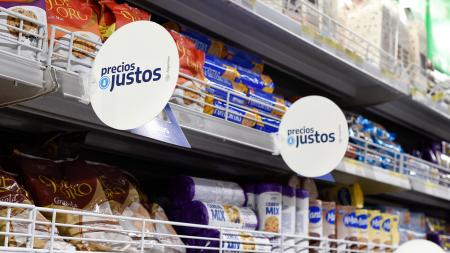The Ministry of Commerce established fines of up to $71 million, for non-compliance that could be incurred by retail and wholesale supermarkets that sell the products participating in the program Fair prices. The measure was formalized through Resolution 12/2023 published this Friday in the Official Gazette.
Specifically, the regulations modify Resolution 118/2022 where the ranges of fines provided for in the collaboration agreements between the Commerce secretary and the municipalities of the various provinces that contribute to the inspection and control activities of Fair Prices.
The hardening of the penalties stems from a specific modification that was made in the Budget 2023 to the Consumer Defense Law No. 24,240.
The 1994 regulation in its article 47 established as sanctions, depending on the case, a warning, the confiscation of the merchandise object of the infringement, the closure of the establishment or, in the case of economic fines, sanctions of between $100 and $ 5 million, having as a parameter reaching triple the illegal profit obtained by the infringement.
These last amounts had remained unchanged since 2008, losing effect due to the accumulated inflation since then.
Through this year’s Budget Law, an increase of up to 4,200% was established in said fines, now taking as a parameter -adjustable to inflation- the Total Basic Basket (CBT) for the Home 3 published by the National Institute of Statistics and Censuses of the Argentine Republic (Indec).
Fines can range between 0.5 and 2,100 CBT.
Therefore, taking the last basket published last December ($121,420), the fines can range from $60,710 to $254,982,000.

Amount and details of fines
Taking this framework, the area conducted by Matias Tomboliniupdated this Friday the fines that supermarkets may be subject to in case of non-compliance.
In the case of program product offers at higher prices than those established, the fines will be between the $4,613,960 and the $35,697,480with the minimum and maximum amounts of the fines varying depending on the point of sale, another novelty of the regulations that previously did not differentiate them.
In the case of the first recidivism, the fines may be increased by 40%, while if it is breached for the second time they may be increased up to 100%, thus reaching $71,394,840 in the case of wholesalers. Previously, for these breaches, the fines could only be between $500,000 and $1 million.
In the event that a lack of supply in each branch of the companies of at least 80% of the planned products, without their respective substitutes being offered, the fines will be between $1,821,300 and $14,327,560.
Before this regulation, as in the first case, the fines ranged between $500,000 and $1 million.
if there was a lack of identification of signage of the program of at least 80% of the products included in the corresponding agreements, penalties of between $1,427,040 and $13,477,620 will be applied.
Before, the penalties in this case ranged from $200,000 to $400,000, so the maximum fine, in the case of wholesalers, will have an increase of 3,269.41%.
Likewise, when in the case of using the signage, products that do not correspond are available, the fines will go from a range between $150,000 to $300,000 to be between $1,335,620 and $10,684,960, depending on the point of sale.
In the case of finding the “establishment of any restriction on the number of products for sale by consumer or family group without prior authorization by the Ministry of Commerce”the sanctions will go from a range between $250,000 to $500,000 to be between $2,306,980 and $17,727,320.
The resolution also sets fines in the case of non-food products, differentiating between “stores” Y “superstores” of these products, as well as their web platforms, and applying the same percentage increase in the case of recidivism.
For web platforms and stores, the same sanctions as the points will be applied “Web” Y “express” of food, while for “superstores” they will be equivalent to those of supermarkets.
#FAIR PRICES SUMMER ☀️??
In these days of extreme heat it is important to hydrate and you can do it with #FairPrices.
Know all the products and prices by downloading the APP of the program or by entering: https://t.co/BoOBkx1BH8 pic.twitter.com/Q85I8BKtqF
– Secretary of Commerce (@ComercioArg) January 19, 2023
















